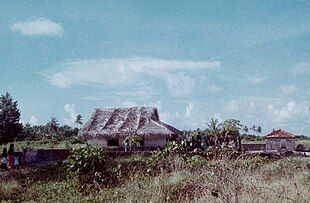Gen Mosque
| Gen Miskit | |
|---|---|
Dhivehi: ގެން މިސްކިތް | |
 Gen Miskit in 1984 | |
| Religion | |
| Affiliation | Sunni Islam |
| Sect | Sufism |
| Ecclesiastical or organizational status | Mosque |
| Status | Active |
| Location | |
| Location | Dhadimagu, Fuvahmulah, Gnaviyani Atoll |
| Country | Maldives |
Location of the mosque in the Maldives | |
| Geographic coordinates | 0°17′54.1″S 73°25′37.1″E / 0.298361°S 73.426972°E |
| Architecture | |
| Style | Traditional Maldivian architecture |
| Date established | c. 1300 |
| Materials | Stone; sandstone |
The Gen Miskit[a] (Dhivehi: ގެން މިސްކިތް) is a Sunni Islam mosque, located in the district of Dhadimagu, in Fuvahmulah, on the Gnaviyani Atoll, in the Maldives. Built in c. 1300[1][2] and before 1378,[3] it is one of the oldest mosques in the Maldives. The mosque is made of coral stone and was built straight after the conversion to Islam.[4] The mosque is not facing towards the Qibla.[3]
Overview
[edit]The Gen Miskit is located in the district of Dhadimagu at the northern end of Fuvahmulah.[2] It's now a revered site for its historical significance to the island.[5] It's the first mosque that the residents of the island did their Friday prayer and Eid prayers.[6][7]
There are disputes whether Gemmiskiy is the oldest mosque in the Maldives and in Fuvahmulah, media reports and residents say that it is the oldest. However, in a monograph written by H.C.P. Bell, Fuvahmulah had four mosques prior to Gen Miskit.[2][6][7] It is really uncertain.
There has been some concern about the extinction of the mosque due to lack of maintenance by the Fuvahmulah City Council.[8]
Features
[edit]The mosque has a communal well, a rectangular ancient circular bath known as ‘Genmiskiy Veyo’ and a cemetery with enclosed shrines “ziyaarat” of revered religious figures.[5]
Shrine
[edit]A place constructed with sandstone and protected by bricks.[5] It is also said that the person who built the mosque, Addu's Meedhoo Abu Bakr Naib Kaleygefaanu, is buried at and Ah Naib Al-Hafiz Abubakr, potentially the first proselytizer of Islam in the island.[5][9][7]
Veu
[edit]Gemmiskiy Veu or Veyo is a rectangulat bath that is adjacent to the Southeastern wall of the mosque that has waters going down into the waters.[5] It shares similarities with the baths in monasteries in Pokna and Anuradhapura in Sri Lanka.[5]
Well
[edit]The well is crafted from sandstones and has unique stories about it.[5] It is said by the residents of the island that the water tastes really sweet and each corner of the well has a unique taste.[6]
Gallery
[edit]-
The shrine, at the mosque
-
Veyo, at the mosque
-
An unmarked grave, at the mosque
See also
[edit]Notes
[edit]- ^ alternatively spelled as Gemmiskiy.
References
[edit]- ^ Sholeh, Muhammad (April 9, 2021). "Mengenal Gen Miskit, Masjid Karang Pertama di Maldives" [Get to Know Gen Miskit, Maldives' First Coral Mosque]. Faktual News (in Indonesian). Retrieved January 27, 2022.
- ^ a b c Solih, Aishath Shuba (April 2, 2024). "Fuvahmulah City – The Days of the Past and Reigning Ramadan Rituals". The Edition. Retrieved June 19, 2024.
- ^ a b "ާއާސާރީ މިސްކިތް ތަކުގެ ލިސްޓް" [List of ancient mosques] (PDF). Ministry of Islamic Affairs (in Divehi). p. 26. Retrieved June 20, 2024.
- ^ Mauroof, Mohamed Jameel; Ahmad, Yahaya. Coral Stone Mosques of Maldives: The Vanishing Legacy of the Indian Ocean. ORO Editions. ISBN 9780986281846. [page needed]
- ^ a b c d e f g "Gemmiskiy". Visit Fuvahmulah. Retrieved June 19, 2024.
- ^ a b c "ފުވައްމުލަކު ގެން މިސްކިތާއި ހަތަރުކަނުގައި ހަތަރު ރަހަލާކަމަށް ބުނާ ވަޅު" [The well in Fuvahmulah's Gen Miskit has four different unique tastes]. ThePress (in Divehi). April 10, 2023. Retrieved June 20, 2024.
- ^ a b c Hassan, Muneeru (September 3, 2015). "ގެންމިސްކިތް: ފުވައްމުލަކުގެ އެންމެ ފުރަތަމަ މިސްކިތް" [Gen Miskit: Fuvahmulah's first mosque]. Sun (in Divehi). Retrieved June 20, 2024.
- ^ Hassan, Nimaa (March 12, 2023). "ފުވައްމުލަކުގެ އާސާރުތައް ނުބެލެހެއްޓި ނެތިދަނީ". Adhadhu (in Divehi). Retrieved June 20, 2024.
- ^ "FUVAHMULAH HISTORY". Fuvahmulah City. May 2, 2024. Retrieved June 19, 2024.




